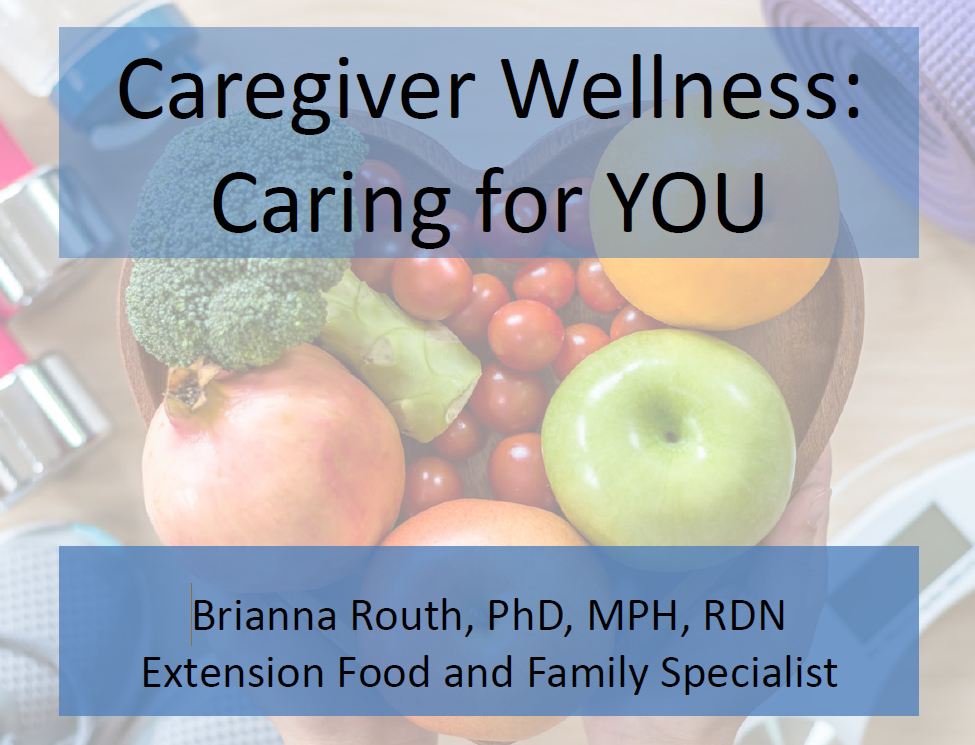Caregiver Wellness: Caring for YOU
Brianna Routh, PhD, MPH, RDN, Extension Food and Family Specialist

View, print, or download Brianna Routh PowerPoint presentation
Put on your own mask first
- Recognize you work with others.
- Taking daily breaks.
- Taking vacations.
- Being realistic.
Physical Needs: Food
Make every bit count.
New dietary guidelines just came out. All food groups give us important energy and nutrients to keep our body functioning, so its important to eat a variety of colors and types of foods, like a variety of colors of fruits and vegetables or different types of protein sources. What you do might be different than the person next to you, for one person cooking may be a form of self-care, for someone else it may add more stress so using a meal planning service or relying on the grocery store to chop your vegetables may be an option. Current guidelines encourage that, sometimes with help that MSU Extension is here to support you or your caregivers, you can make myplate fit within any cultural, budget, or personal preferences! It doesn’t have to be at every meal, but consider over time how you can make every bit count.
Physical Needs: Activity
Move More, Sit Less.
The current guidelines to strive for would be to get at least 150 to 300 minutes of moderate-intensity aerobic activity each week. Similar to the food and nutrition guidelines, this is a goal to strive for- not necessarily something that can be achieved in a day for most Americans, and especially those feeling many pressures on their time. Any amount of increased movement can have positive physical and mental self- care impacts though. Even if it is taking the dog around one more block, dancing to music while you wash the dishes, or turning off your camera so you can do stretches during a zoom meeting.
https://health.gov/our-work/physical-activity/current-guidelines
Physical Needs: Sleep
Quality Sleep Matters.
The recommended sleep intake for most adults is between 7 to 9 hours a night, but this may be different for everyone. We can’t always guarantee this amount of sleep, but sleep quality matters too, so it is also important to explore and understand what helps you relax. Often one of the first ways you can work to improve your sleep and restful restoration is through improving your sleep hygiene: consistent times/patterns to get your brain primed for sleep, avoid caffeine, alcohol, large meals right before bed, keep room dark, quiet, and relaxing, avoid electronics in your room (light matters to your brain), exercise and balanced foods can also help!
https://www.cdc.gov/sleep/about_sleep/how_much_sleep.html
Emotional Needs: Feelings
All feelings are OK.
What feelings do you have about being a caregiver? In order to support your feelings, you need to find your outlet for processing these emotions to figure out what to do with them or if anything needs to be done. For some this might be giving yourself a pause, having strategies to reframe thoughts, feelings, or communication strategies, some express through humor or crying, incorporating physical care strategies to partner with feelings, connecting with a support person or mental health professional.
Emotional Needs: Stress
Identify what you can and cannot change.
We all experience stress, and some stress is good for your body as well as a natural part of life. This is short term stressers that prompt the fight or flight response in our brains. When these stressers are long term or chronic though, they become hard for your brain and body to “turn off”. This can have additional impacts on your physical and emotional wellbeing, so it is important to become aware and recognize what are your body’s warning signs that you might be experiences chronic stress. Once you know what to look for, you can identify the source of stress and determine what or if there are any parts of that stressor you could change. Some things we cannot change easily when it comes to care demands so this may involve creativity and supports in order to take action in addressing that stress. Many of these self care strategies we have talked about so far can be good first steps to see if they help reduce that stress even if it cannot be entirely eliminated.
Set SMART Goals
S: Specific
M: Measurable
A: Attainable
R: Relevant
T: Time-Bound
You might have to try different approaches, change and update your goals based on how successful you have been. Remember its ok to not meet your goals every time, this is normal, find YOUR support people who can help you achieve your goals, hold you accountable, and generally provide supportive encouragement along the way.
Goals may not look the same and that is ok, one person may finding cooking to be a stress reliever while another person may turn to pre-made meals with store prepped fruits and vegetables to meet their food needs and reduce stress. One person may find it helpful to increase their duration or effort in current exercise routine, while another may just be incorporating more movement into daily activities. One person may find it critical to talk to someone else while another may find it helpful to find things that make them laugh.
You can’t tackle all of these at once and you also don’t want caring for yourself to add more stress to your daily life, so ID one thing towards one goal that seems realistic.
Moving Forward
- Focus on what we can do
- Remember, we can’t do it all
- Set goals and work towards them
- Get help when needed
MSU Extension Resources
- MT Kinship Navigator Program
https://msuextension.org/mtknp/
- Educational Offerings
–Powerful Tools for Caregivers
–Active Parenting or Parenting A Second Time Around
–Strong People
–Eat Smart, Live Better
–Mental Health First Aid
- MontGuide Publications
https://store.msuextension.org/Departments/MontGuides-by-Category.aspx
- Your Local Extension Agents and Specialists
